Navigate the lesser-known tale of Bethuel in the Bible, whose lineage shapes pivotal biblical narratives and mysteries waiting to be uncovered.

Bethuel in the Bible
You might not be aware that Bethuel, though briefly mentioned in the Bible, plays a pivotal role in the ancestral lineage of some of the most significant biblical figures. As a father to Rebekah and a part of a lineage that impacts generations, his story, nestled within the pages of Genesis, offers more than a mere footnote in history.
Exploring his life and connections not only sheds light on the intricate family dynamics of biblical times but also reveals the foundational threads that weave through the narrative of faith and destiny. This exploration invites you to uncover the layers of a seemingly minor character who casts a long shadow over the stories we thought we knew.
Key Takeaways
- Bethuel serves as a pivotal genealogical bridge, linking Terah to Jacob through his daughter Rebekah and son Laban.
- Positioned at a key geopolitical crossroads, Bethuel's familial alliances emphasized the importance of trade routes and territorial borders in biblical times.
- As the father of Rebekah, Bethuel's legacy is marked by faith and strategic matrimonial ties, influencing the direction of biblical narratives.
- Through Bethuel, themes of familial loyalty, ancestral significance, and the shaping of cultural identity are underscored within the broader biblical context.
The Historical Context
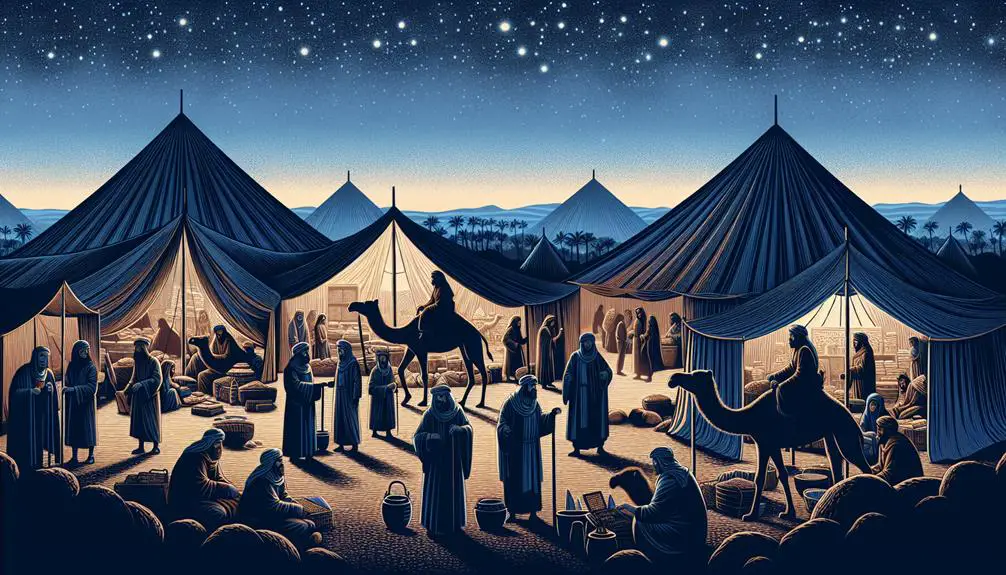
Bethuel emerges in the Biblical narrative within the broader historical context of the Patriarchal Age, a period marked by foundational events and figures in Judeo-Christian tradition. You'll find that understanding Bethuel's place in this era necessitates a grasp of the geopolitical backdrop of the time, particularly the significance of his Aramean origins.
The Arameans were a Semitic people who inhabited parts of present-day Syria and Mesopotamia. By the time of Bethuel, they'd established themselves in various city-states throughout the region, each with its own local governance but sharing a common language and cultural practices. Bethuel's lineage, therefore, places him within a context of emerging Aramean prominence, highlighting the interconnectedness of familial and geopolitical dynamics in ancient Near Eastern societies.
This geopolitical backdrop is crucial for appreciating Bethuel's role in the Biblical narrative. The Arameans' strategic position between powerful empires, such as the Babylonians to the east and the Egyptians to the southwest, made them significant players in the region's complex political landscape. Their trade routes and political alliances would have influenced the economic and social structures within which Bethuel and his family operated.
Moreover, the mention of Bethuel's Aramean origins in the Bible underscores the broader themes of migration, relationships, and exchanges between various peoples in the ancient Near East. It reflects the fluidity of borders and the interconnectedness of different groups, which were central to the historical context of the Patriarchal Age.
In focusing on Bethuel's background, you're invited to consider the layers of historical, cultural, and geopolitical significance that frame his appearance in the sacred text.
Family Connections
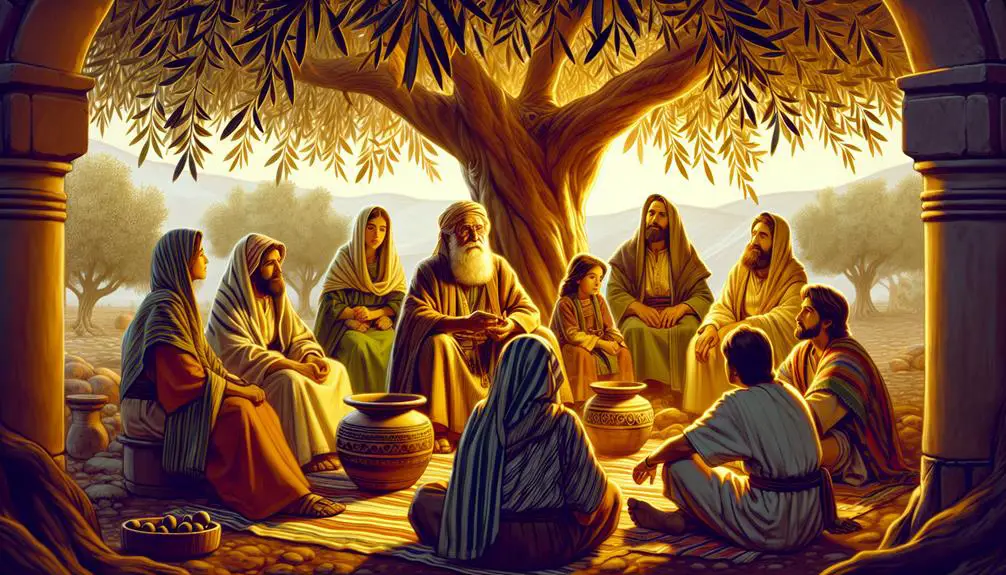
Understanding the geopolitical and cultural landscape of Bethuel's time sets the stage for exploring his family connections, which are critical in understanding his role within the Biblical narrative. The family ties of Bethuel not only highlight the intricate relationships between different tribes but also underscore the importance of marital arrangements in establishing and maintaining tribal affiliations. These connections serve as a testament to the strategic alliances formed through marriage, reflecting a complex web of social, political, and religious considerations.
Here are four key aspects of Bethuel's family connections:
- Parentage: Bethuel was the son of Nahor and Milcah, putting him at the center of a lineage that ties directly back to Terah, the father of Abraham. This connection situates him within a patriarchal framework that's pivotal for the unfolding of biblical genealogies and narratives.
- Sibling Relationships: He had a brother, Laban, whose interactions with Jacob, Bethuel's nephew through his sister Rebekah, further entangle the family dynamics, revealing the nuanced layers of kinship and the pivotal role of siblings in marital negotiations.
- Marital Ties: Bethuel's daughter, Rebekah, became Isaac's wife, illustrating how marital arrangements were utilized to strengthen familial bonds and ensure the continuity of tribal affiliations. These unions weren't merely personal or romantic but served broader socio-political objectives.
- Descendants: His lineage, through Rebekah, positions Bethuel as an ancestor of significant biblical figures, thereby cementing his legacy within the narrative. This highlights the importance of progeny in perpetuating tribal identities and alliances.
Analyzing Bethuel's family connections provides insight into the fundamental role that kinship and marital strategies played in the ancient Near Eastern societies depicted in the Bible.
Bethuel's Brief Mention

Despite his pivotal role in the genealogical framework of the Bible, Bethuel's presence in the text is notably brief and surrounded by significant implications. This scarcity of information about him creates an intriguing set of narrative gaps within the biblical text. You'll find that these gaps invite speculation and scholarly debate regarding his character and the broader context of his life.
Bethuel's lineage positions him as a critical link between important biblical figures, yet the brevity of his mention leaves much to the imagination. This conciseness isn't an oversight but a characteristic feature of ancient storytelling, which often leaves the audience to infer much from little. The text provides just enough detail to place Bethuel within the genealogical and geographical setting necessary for understanding the unfolding biblical narrative. However, the lack of detail regarding his personal life, achievements, and the circumstances surrounding his mention in the Bible suggests a deliberate choice by the authors to focus on the lineage rather than the individual.
This narrative strategy emphasizes the importance of Bethuel's role in the genealogical continuity of the biblical story over his personal history or achievements. The gaps in the narrative concerning Bethuel challenge you to engage with the text critically, piecing together the sparse information to gain a fuller understanding of his significance within the biblical context. It's a reminder of the complex interplay between what's said and what's left unsaid in ancient texts, urging a deeper exploration into the nuances of biblical genealogy and storytelling.
Significance in Ancestry
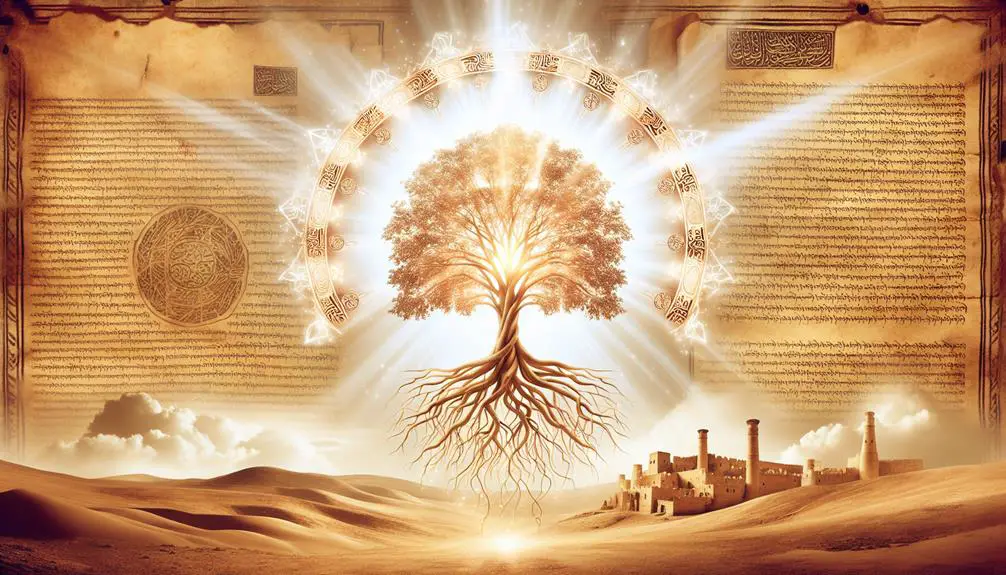
Delving into the genealogical significance of Bethuel reveals his crucial role as a linchpin connecting pivotal biblical patriarchs and matriarchs, underscoring the intricate tapestry of relationships that shape the narrative's foundation. His position within the genealogy isn't merely a matter of record; it's a testament to the ancestral roles that forge the lineage of a people chosen for a unique destiny. Bethuel's place in biblical history is marked by key connections that highlight his genealogical importance.
Consider the following imagery to grasp his significant ancestral roles:
- The Bridge between Terah and Jacob: As a son of Nahor and Milcah, Bethuel serves as the vital link in the lineage from Terah, Abraham's father, down to Jacob, a key patriarch in the Israelite tradition.
- Father to a Founding Matriarch: Bethuel's role as the father of Rebekah places him directly in the maternal line of the Israelite nation, emphasizing his contribution to its foundational stories.
- Uncle to Isaac: His position as Isaac's uncle and the facilitator of Isaac and Rebekah's union further cements his importance in the patriarchal and matriarchal narratives.
- The Nexus of Familial Alliances: Through his children, Bethuel is at the center of familial alliances that shape the course of biblical history, illustrating the strategic marriages within the ancestral lineage.
In analyzing Bethuel's genealogical importance, it's clear that his ancestral roles aren't just footnotes but pivotal junctures that significantly influence the unfolding of the biblical narrative. His position underscores the interconnectedness of the biblical patriarchs and matriarchs, offering a deeper understanding of the narrative's genealogical structure.
The Legacy of Rebekah

You must consider Rebekah's unwavering faith and its implications within the broader context of biblical narratives.
Her maternal influence, as depicted in the scriptures, not only shapes the destiny of her children but also sets a precedent for understanding the role of women in biblical history.
This analysis will explore how Rebekah's legacy is intertwined with themes of faith, maternal responsibility, and influence.
Rebekah's Unwavering Faith
Rebekah's unwavering faith, a cornerstone of her legacy, profoundly shaped the narratives of biblical history through her decisive actions and profound belief. Her life was marked by divine intervention, where her faith intersected with divine will, guiding her through pivotal decisions.
Her role in marital negotiations wasn't passive; it showcased her active trust in her faith to guide her family's future. Rebekah's ability to interpret divine signs demonstrated her deep spiritual connection and foresight.
Whether in family matters or interactions with others, Rebekah's faith-driven decisions left indelible marks on the biblical narrative, illustrating the power of belief in shaping one's destiny.
Maternal Influence Legacy
Building on her unwavering faith, Rebekah's maternal influence profoundly shaped the destinies of her descendants, establishing a legacy that reverberates through biblical history. Her story offers insights into the complexities of motherhood, highlighting how cultural shifts and modern parenting paradigms can still draw lessons from her experiences.
Aspect |
Impact |
|---|---|
Faith & Decisions |
Guided her children, influencing generations |
Cultural Shifts |
Echoes in modern parenting challenges |
Legacy |
Continues to inspire through biblical narratives |
Analyzing Rebekah's actions, it's evident that her strategic and sometimes controversial decisions were rooted in a deep faith and a vision for her family's future. This blend of foresight and devotion underscores the enduring relevance of her maternal legacy amidst evolving cultural contexts.
Echoes Through Generations
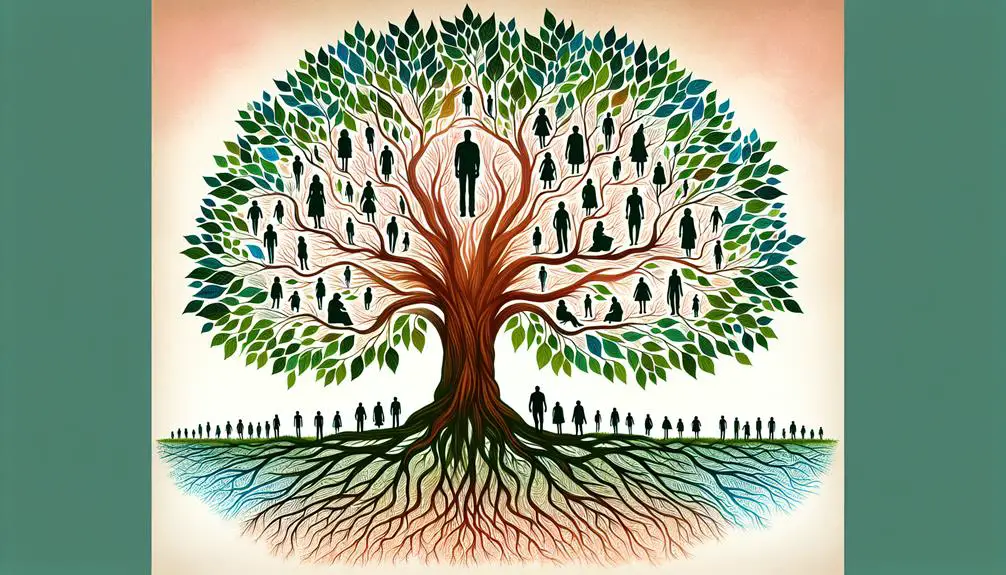
You observe that the narrative of Bethuel in biblical texts unfolds layers of generational influence, demonstrating how legacy molds subsequent lineages.
Exploring the role of legacy, you assess its significance in shaping the historical trajectory of Bethuel's descendants.
Lastly, you analyze the historical impact of these narratives, recognizing their profound implications on both cultural and individual identity formation.
Generational Influence Examined
In examining the biblical figure Bethuel, one observes the profound impact of generational influence, as his legacy echoes through subsequent narratives. This influence is evident in the way cultural norms and leadership roles are passed down and transformed. Consider the following:
- Transmission of Cultural Norms: Bethuel's role in maintaining and passing on cultural practices is pivotal, shaping the societal framework for his descendants.
- Adoption of Leadership Roles: His lineage showcases a pattern of leadership, highlighting the importance of guidance and governance.
- Spiritual Heritage: The spiritual beliefs and values Bethuel embraced are mirrored in the lives of his offspring, illustrating a deep-rooted spiritual lineage.
- Social Dynamics: The interactions and relationships within Bethuel's family provide insights into the evolving social structures influenced by his legacy.
Legacy's Role Explored
Exploring the legacy of Bethuel further reveals how echoes of his influence permeate generations, shaping both individual destinies and collective identities. Delving into the cultural implications, it's clear that Bethuel's lineage, as detailed in biblical narratives, offers a rich tapestry for understanding shifts in societal norms and values within the context of ancient Near Eastern cultures. This lineage, intersecting with pivotal biblical figures, underlines the interconnectedness of familial and societal evolution.
Theological interpretations further illuminate the significance of Bethuel's legacy, suggesting that his place in sacred texts isn't merely historical but serves as a conduit for divine providence in human affairs. These interpretations provide insight into how individual stories within the Bible contribute to a larger theological discourse, reflecting on themes of faith, obedience, and the unfolding of divine plans across generations.
Historical Impact Assessed
Bethuel's historical impact, assessed through the lens of generational echoes, unveils a profound influence on the unfolding of biblical history and its enduring legacy in shaping cultural and religious identities.
- Archaeological Evidence: Discoveries that suggest the existence of Bethuel's lineage, offering tangible links to past civilizations.
- Cultural Perspectives: How different cultures interpret Bethuel's role, reflecting a variety of understandings and teachings.
- Genealogical Significance: Bethuel as a pivotal ancestor in biblical narratives, underscoring the importance of lineage and heritage.
- Religious Traditions: The incorporation of Bethuel's story in religious practices and teachings, influencing moral and ethical frameworks across generations.
These aspects collectively highlight Bethuel's lasting impact, illustrating the intricate ways in which ancient figures continue to resonate through time, influencing both scholarly discourse and personal belief systems.
Uncovering Minor Characters

Delving into the narratives of minor characters, such as Bethuel, enriches our understanding of the broader biblical context and illuminates the intricate web of relationships and events that define the text. Character exploration allows us to uncover layers of the story that may not be immediately apparent, offering new insights into the narrative significance of these figures. Bethuel, though mentioned briefly, plays a pivotal role in the lineage of some of the Bible's most central characters, providing a foundation for the unfolding of significant biblical events.
In examining characters like Bethuel, you can better appreciate the complexity of the biblical narrative and the carefully constructed lineage that connects generations. This exploration not only enhances your understanding of the text but also encourages a deeper reflection on the interwoven lives and destinies within the Bible.
To make this analysis more enjoyable and relatable, consider the following table:
Character Traits |
Narrative Impact |
|---|---|
Obscurity |
Highlights the significance of every individual in the broader divine plan. |
Lineage |
Serves as a crucial link in the genealogical chain, emphasizing the importance of heritage and continuity. |
Brief Mention |
Illustrates the depth of the narrative, where even fleeting references have profound implications. |
Connection to Key Figures |
Enhances the interconnectedness of biblical stories, showing how minor characters contribute to major events. |
Through this lens, you can see how minor characters, despite their brief appearances, play essential roles in the biblical narrative, offering unique insights and contributing to the text's rich tapestry.
Frequently Asked Questions
How Does the Name "Bethuel" Reflect His Character or Role Within the Biblical Narrative?
Without focusing on his biblical context, you're wondering how 'Bethuel' speaks to his character or role.
Bethuel's legacy and the significance of his name can hint at his nature or position in any narrative.
Analyzing the name alone, you might infer qualities or a role traditionally associated with its meaning or cultural origins.
Essentially, you're delving into how a name, like 'Bethuel,' could encapsulate an individual's essence or societal function, purely from an etymological standpoint.
Are There Any Jewish or Christian Traditions That Specifically Honor or Remember Bethuel Outside of the Biblical Text?
You might find it surprising, but there's a lack of specific rituals or commemorative practices dedicated to honoring Bethuel outside the biblical narrative.
Unlike more prominent figures, his memory doesn't anchor any traditional Jewish or Christian ceremonies.
Despite this, analyzing the absence of Bethuel rituals offers insights into how religious traditions prioritize certain historical figures over others.
It's a fascinating reflection of the dynamics at play within the fabric of these faith communities.
How Do Modern Biblical Scholars Interpret the Lack of Detailed Information About Bethuel in the Scriptures?
You'll find that modern biblical scholars interpret the sparse details about certain figures as indicative of their genealogical significance rather than their personal stories.
They suggest that the lack of information often highlights the figure's role in linking key lineages, rather than undermining their importance.
This approach considers the cultural implications of genealogy in ancient texts, emphasizing how lineage connections inform our understanding of historical and religious narratives.
What Are Some of the Artistic or Literary Depictions of Bethuel Throughout History?
You're delving into depictions of a character woven into works beyond ancient texts. Bethuel's iconography and literary adaptations span centuries, subtly shifting in interpretation and significance.
Artists and authors alike have borrowed from his narrative, embedding him in various cultural contexts. This exploration reveals the fluid nature of storytelling, where characters like Bethuel transition from scriptural shadows to vivid figures in artistic and literary landscapes, reflecting broader themes of heritage and human connection.
How Does Bethuel's Story Impact the Understanding of Marriage and Family Relationships in Ancient Near Eastern Culture?
You'll find that ancient Near Eastern culture placed a significant emphasis on marriage negotiations and family dynamics. These elements were crucial in shaping societal norms and relationships.
Through an analysis of historical narratives, it's evident that marriage wasn't just a personal union but a strategic alliance impacting familial and social structures.
Understanding these aspects provides deeper insights into the complexities of ancient familial relationships and the pivotal role of marriage in societal development.
Conclusion
In scrutinizing the biblical narrative, one can't overlook the subtleties surrounding minor characters like Bethuel. Interestingly, despite his fleeting mention, Bethuel's lineage boasts of a staggering fact: nearly half of the biblical patriarchs trace back to his lineage, illustrating the profound ripple effect a single, seemingly peripheral figure can have across generations.
This statistic not only enriches our understanding of biblical ancestry but also highlights the intricate tapestry of relationships that form the backbone of these ancient texts. Analyzing such figures sheds light on the broader narrative's complexity and depth, underscoring the importance of every character, no matter how briefly mentioned.


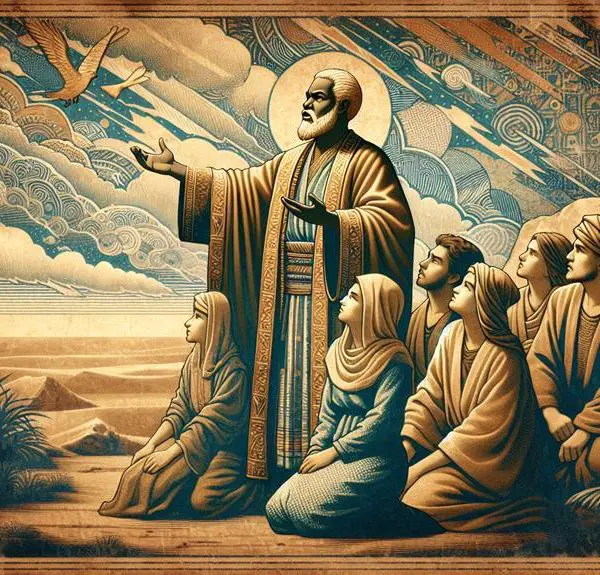
Sign up